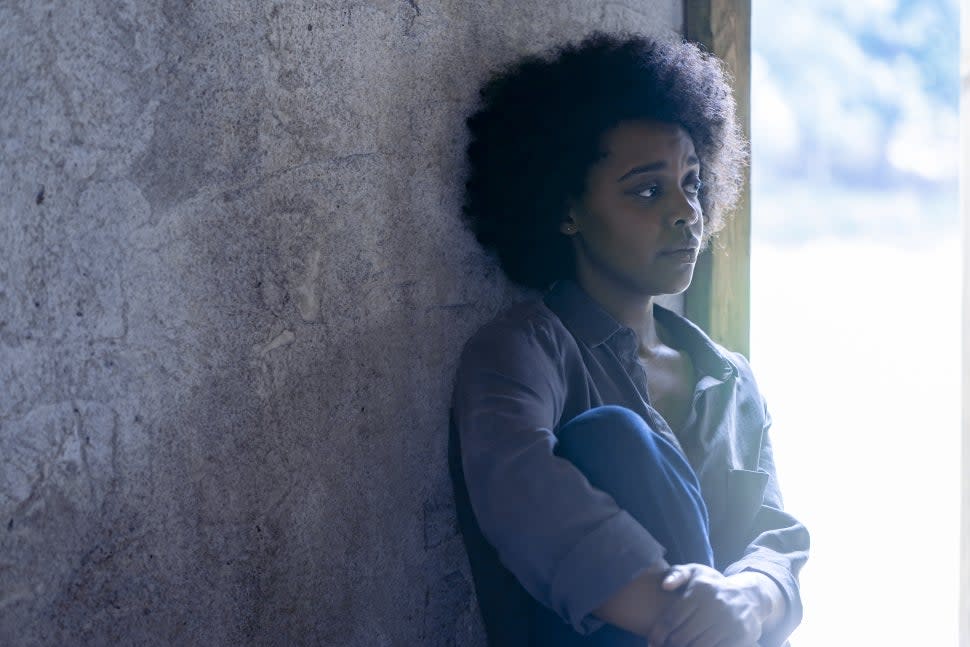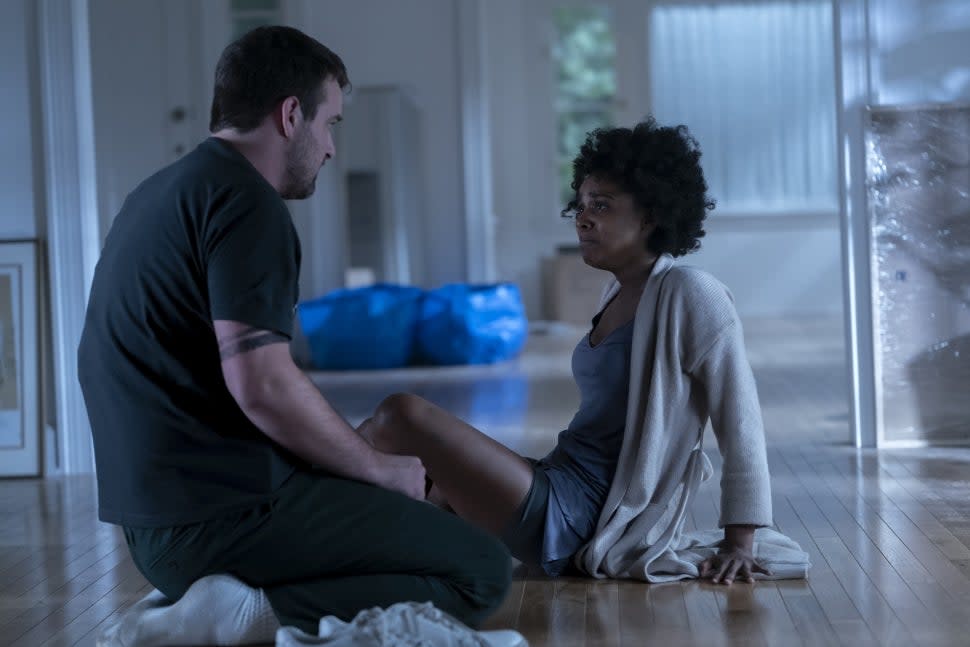'Kindred': Inside the Key Change Made to Octavia Butler's Novel for the FX Series (Exclusive)
For the first time since it was published in 1979, Octavia E. Butler's acclaimed sci-fi novel, Kindred, has been adapted for TV. More specifically, the novel is the source material for an eight-episode FX series about time travel from the present-day Los Angeles to the Antebellum South from showrunner Branden Jacobs-Jenkins and executive producers Darren Aronofsky and Joe Weisberg.
In fact, the Kindred series, which is now streaming on Hulu, is the first of Butler's work to make it to the screen, with adaptations of Dawn, The Parable and Wild Seed also in various stages of development. And Jacobs-Jenkins hopes there are more to come. "We need a Butler universe, honestly," he tells ET. "It would be a total thrill to see those things come [together]."
Until then, Jacobs-Jenkins has the honor (and pressure) of being the first one out of the gate and to "get to be the one who gives sort of a physical form to a beloved text in this way," he says, adding that "it's just a thrill to be part of that upsell because it's long overdue and she's really one of the most important literary minds of our time."
That said, bringing Kindred to the screen was no easy feat. And for the showrunner, that required years of developing this adaptation – not as a two-hour film, but as a series that could explore a story about relationships and the passage of time. "It's about a woman who has to have a very slow realization about her own kind of position as a moral person and a subject in a larger universe," he says.
While speaking with ET, Jacobs-Jenkins goes on to explain the key change he made to Butler's novel, how this is just the first season of many to come, and what he learned while serving as a consulting producer on the writing team for Damon Lindelof's Watchmen series.

ET: Watchmen was a real game-changer for TV and I was curious how working on that series influenced what you were able to do here?
Branden Jacobs-Jenkins: It's so funny. I was working on Kindred while I was in that room. And if there's a book I love as much, if not more than Kindred, it's Watchmen. So, I was definitely hyped. I was very excited to be working on both those things. For me, they were opportunities to really immerse yourself in the minds of someone you admire as a creator. And that was definitely the joy of that. I would say too, Watchmen, you know, was famously -- and I think Damon was talking about this -- a very difficult room because the subject matter was difficult. For me, it was important to understand that that doesn't necessarily mean it's not worth it.
One thing that I think Damon ultimately gave me permission to do was to think about adaptations and how the best adaptations aren't replacements for the text. But they somehow enhance the text or that they're expansions of the text and they reward the fans but they don't alienate the newcomers.
I felt like that if I took one thing away from that experience, it was this idea that I don't need to make a beat for beat, word-perfect carbon copy of the book Kindred. But actually, this is an opportunity to try to put it in conversation with the present tense and honor the ideas and see what ideas have legs.
In terms of bringing this story to the screen, I know you've talked about some of the changes you made. But I was hoping you could tell me which change was the most important for the success of this adaptation.
The biggest is by far just how everything comes out of this need to place it in the near present. So, everything else, all the other changes are kind of a direct result of that. And that was huge because it required me to really sift through every detail of the book and try to find its analog and the world that they live in. It felt important to me because I didn't want to create a museum piece or a thing that people felt they could hold at a distance while viewing. I wanted it to kind of live in people's laps in the way that, I think the book, when she wrote it at the time, was a kind of radical challenge to her contemporary readership.
I don't think she would've even known that this book would be made into a TV show 45 years later, or be as widely taught or be as essential to her canon as it's become. But I just wanted to prove that there was something very evergreen about her impulses and about her ideas and what she was trying to do at the time.

And when it came to setting the story in 2016, was that an aha moment for you in terms of this coming together? Had you tried writing it still set at the time when Octavia wrote it?
It was a bit of an aha moment. And I think that oddly, it was one of those things when I stumbled upon it, I was like, "Oh, this makes so much sense." And I just kind of went with it. There were versions early on in development where I tried to really hue super closely to the book. But the truth is, a novel written in the first person and a television show are just very different forms. And so, there was never gonna be a way to really experience the juiciness of this novel by just putting a bunch of voiceovers on camera, you know? I think her ideas are bigger than the trapping of the time period, ironically enough.
That said, do you feel like you got there in terms of capturing her ideas for the screen?
Well, I mean, it's not a limited series. So, hopefully we have many seasons with which to unpack these big ideas. I think eight hours is not enough time to. And, you know, we didn't cover the whole book either. We didn't get the whole book into the first season.
When looking forward to the future of the series, do you ever see yourself going beyond the text that Octavia has written? Or is this something that really adheres to what she wrote in the novel?
It's such a complicated question because I do think we've tried to set things up that might allow us to extend some of these ideas and stories and characters beyond the storytelling in the book itself. In the writers' room, I thought a lot about expansion as our kind of M.O. But at the very least, I'm just trying to, as a super fan, I just want to make sure every inch of this book and spirit does sort of find its way into consideration, if that makes sense.
Kindred is now streaming on Hulu.
This interview has been edited and condensed for length and clarity.
RELATED CONTENT:
'Kindred' Trailer Brings Octavia Butler's Classic Novel to Life: Watch!
Barry Jenkins Talks ‘The Underground Railroad’ and Black Sci-Fi (Exclusive)
'Lovecraft Country' Creator Talks Changes From Book, Future Seasons (Exclusive)
